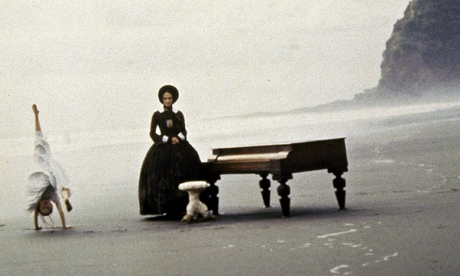
The New Zealand-born, Australia-resident Jane Campion won the 1986 short film Palme d'Or at Cannes with her nine-minute Peel, shared the Palme d'Or for The Piano (with Chen Kaige's Farewell My Concubine) in 1993, and presided over the Cannes jury in 2014. The Piano is her best, most popular movie. Set in mid-19th-century New Zealand, it's shot in an exquisite, painterly fashion by Stuart Dryburgh that gives the landscape an appropriately exotic look, and has one of Michael Nyman's most haunting scores. From the start this intimate fable of colonial life takes on a mythic resonance, as Ada McGrath (Holly Hunter), a Scottish woman mute since the age of six, is unceremoniously deposited by rough sailors on a remote, storm-tossed beach with her nine-year-old daughter Flora (Anna Paquin). Ada is there for an arranged marriage to Stewart (Sam Neill), an inhibited ill-at-ease settler mocked by his rowdy Maori employees, and he immediately alienates her by refusing to take responsibility for her proudest possession, a handsome Broadwood square piano.
However his neighbour, the kindly, illiterate Baines (Harvey Keitel), whose Maori facial tattoos indicate he's going native, agrees to swap the piano for a tract of land. It then becomes the centre of contention and estrangement between the three adults and Ada's daughter and takes on a powerful identity of its own, symbolising culture, sexuality and suppressed desire in this brave new world. The consequences are disruptive and violent but ultimately healing.
This haunting tale is superbly acted (both Hunter and Paquin won Oscars for their performances), and Campion (who won an Academy award for best original screenplay) does a remarkable job of evoking the impact of New Zealand on the puzzled European newcomers. Indeed it stands as the most sensitive film yet made about this spiritual encounter, a sea change bringing about a rich and strange transformation. In an interview accompanying this Blu-ray disc, Campion talks of wanting the film to appear as if being shot under water, something that disconcerted her fellow film-makers and evokes Shakespeare's The Tempest. Stewart is a disoriented Prospero, Baines a yearning Caliban (his name an appropriate echo), Ada and Flora two sides of Miranda. Earller Michael Nyman had written both Noises, Sounds & Sweet Airs, a ballet-opera based on The Tempest, and the music for Peter Greenaway's Prospero's Books.

